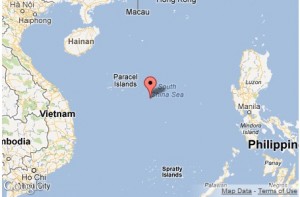
For generations the Vietnamese islanders of Ly Son have braved typhoons and other dangers to bring home fish, but now they also have to contend with patrols sent by Beijing to assert its territorial claims.
Swept along by nationalist sentiment, and forced to venture ever further out to sea to fill its nets, Asia’s fishing fleet is increasingly on the frontline of escalating territorial tensions in the region.
In recent years, China has begun aggressively patrolling around the contested Paracel and Spratly Islands in the South China Sea — known in Vietnam as the East Sea and West Philippine Sea in Manila — using fishing bans and patrol boats to keep foreign trawlers out, according to Vietnamese officials and fishermen.
“They had guns. They trained them on us, forced us to the front of the boat, then they boarded and arrested us,” said Tran Hien, who was detained in March along with his 10-man crew near the Paracel Islands and held for 49 days.
“My first son was born when I was in the Chinese prison,” the 33-year-old boat captain said. “They took my nets, my GPS and I am now heavily in debt.”
Hien’s story is far from unusual — he and his men were held alongside the crew of another Vietnamese boat that was detained the same day. Both captains were beaten and “there was never enough food” for the 21 sailors, he said.
Hanoi says hundreds of fishing boat crews have been arrested near the Paracels and Spratlys by Chinese authorities over the last few years.
With coastal areas depleted by overfishing, the ever-growing ranks of fishermen from Ly Son — located 30 kilometers (20 miles) east of mainland Vietnam — rely on trips to the disputed archipelagos to net valuable hauls of anchovies, tuna and butterfish.
Hanoi claims “indisputable sovereignty” over the island chains, known locally as Truong Sa and Hoang Sa, which are several hundred kilometres off the coasts of both Vietnam and China.
And Hanoi uses the fishermen, at least indirectly, to assert sovereignty claims — rejecting any Chinese efforts to limit its trawlers, such as Beijing’s annual fishing ban.
“Our government encourages us to fish in the Paracels and Spratlys as there are a lot of fish there and it has been our fishing field for many years,” Le Khuan, 52, told AFP at his small house on Ly Son island.
Other regional countries have policies encouraging offshore fishing to relieve pressure on coastal areas and increase their presence in their territorial waters, said a senior fishery officer at the UN’s Food and Agriculture Organisation.
“Of course, in disputed areas this means greater contact with other countries,” Simon Funge-Smith told AFP, adding that it was also putting “considerable pressure” on fish stocks and increasing competition between often-subsidised national fleets.
Beijing has occupied the Paracels, known as Xisha in Chinese, since a brief war with South Vietnam in 1974, and also claims the Spratlys — as do, in whole or in part, Taiwan, Malaysia, the Philippines and Brunei.
Beijing claims as its historical territory virtually all of the South China Sea, which is believed to sit atop huge oil and gas reserves as well as being home to important fishing grounds.
With more Chinese patrol boats and fishermen of all nationalities on the waters and diplomatic tensions over disputed islands running high, observers warn that an escalation is possible.
“There is a real risk… of an overreaction on either side — a fishing boat being fired upon by a patrol vessel,” said Sam Bateman, a maritime security expert at Singapore’s Nanyang Technological University.
Both Hanoi and Beijing “have become much more nationalistic in response to their sovereignty claims,” he added.
Growing patriotic sentiment would also make it hard for either side to back down, with governments forced into “tit for tat” exchanges, he said.
Filipino fishermen have also complained of intimidation from rifle-brandishing Chinese personnel near the Scarborough Shoal, about 230 kilometres (140 miles) from the Philippine coast.
Rival claims flared into a major diplomatic dispute in April when Manila accused Chinese fishermen of taking endangered species, such as clams and corals, from the area.
Philippine efforts to arrest the fishermen were thwarted when two Chinese surveillance vessels arrived at the scene.
And last month South Korea’s coastguard detained 23 Chinese fishermen in the Yellow Sea after a violent clash that left one Chinese crew member dead.
The small fishing communities on Ly Son Island are shocked to find themselves at the centre of an international dispute for simply fishing where they have for generations, a local government official said.
“Fishermen here consider the fishing fields of Truong Sa and Hoang Sa their gardens, their rice fields,” Pham Hoang Linh told AFP in an interview in a yellow, peeling government building on the island as loudspeakers boomed out one of Hanoi’s routine, twice-daily propaganda announcements.
He said arrest by China is “the worst fear” of the families of the some 3,000 fishermen on the island, as without the income from fishing — typically between about $100 and $250 a trip — many islanders risk destitution.
“We try to educate our fishermen to avoid conflict. But we are operating in our own fishing fields so there is no reason to be scared,” Linh, a Ly Son native himself, told AFP.
Unless a solution is found, further confrontations appear inevitable as the fishermen of Ly Son say they will keep plying the disputed waters.
“It is our only source of income. It is our territory, our waters — we will protect our sovereignty, we will keep on fishing,” said Khuan.